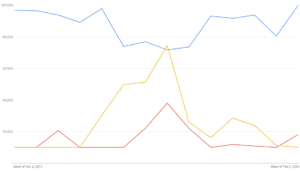Marketing is a forever changing field, and virtually nothing remains unchangeable- keyword match types are one of those things. Keyword match types are a determining factor in how user’s find things like Google ads or Google display ads depending on their query, so they hold a lot of importance.
The running of PPC campaigns have inevitably evolved in alignment with the changing landscape of keyword match types. After all, to run a successful campaign, PPC experts must stay up to date with the latest changes. Struggling to keep up? Don’t worry, as we’ll take you through what keyword match types are and how they’ve changed over time. Let’s get started!
What are keyword match types?

Keyword match types are settings which essentially control how closely a user’s search query needs to match the keywords of your ad in order for it to be placed in the auction or show on the SERP. They can be really useful for driving targeted traffic depending on which type you select, or for gaining a wider reach. However, if you lessen your reach but heighten relevancy, you can avoid wasted spend on unnecessary clicks.
Either way, whatever the goals of your campaign, you can select the right match type for you. As keywords match your ads to whatever your customer is searching for, there are different types to help with this process.
The three different types
To help you gain a deeper understanding of keyword match types, we’ve provided the three different types below. Let’s have a look at them:
- Broad match
With a broad match, a user’s search query just needs to relate to your keywords obtained through keyword research. It doesn’t have to be an exact word for word match. Therefore, as it only needs to relate, it has the highest reach and lowest relevance.
- Exact match
An exact match is basically in the name- a user’s search query needs to exactly match the keywords or the keyword’s meaning. As you can probably guess, this has the lowest reach yet highest relevance.
- Phrase match
Phrase match sits somewhere in between. Whatever a user types into the search engine only needs to include the meaning of the keywords. Following the same pattern, this therefore means it has medium reach and medium relevance.
What changes have been made over time?

While before 2014 an exact match really did mean exact (it wouldn’t account for any manual errors from the user), in 2014 Google introduced ‘close variants change’ for phrase match and exact match. Basically, this meant it would take into consideration misspelt words from the user. This was only the beginning.
Then in 2017, word order no longer had that much impact. For exact match types, it didn’t matter what order a user wrote the keywords- all that mattered was that they were there. This impacted PPC as consultants had to modify campaigns in accordance with this change. For example, because variants had been broadened so much, exact match type became redundant for those ad campaigns that relied on word order.
A further change is Google’s addition of words that mean the same. Therefore, Google’s approach to keywords is now less about the exact words and more about meanings and topics. This accounts for a user’s search intent and attempts to humanise the approach to search queries by allowing for variation.
One of the latest changes is now including features of BMM (broad match modifiers) to phrase matching. The change in 2021, as stated by Google, means that ‘phrase match will expand to cover additional broad match modifier traffic’. Phrase match also only takes into consideration the word order when it shifts the meaning of the query.
The impact on PPC

Keyword grouping words that are closely related is now one of the best campaign strategies for PPC in response to the changes. If you use automated bidding strategies, grouping keywords like that offers automated strategies more data to work with. Broad match change picks up additional signals (such as landing pages or ad groups) so pairing this with smart bidding lets you broaden opportunities for your campaign.
However, an increase in ad spend may be seen- this is because of the new lack of control for PPC specialists, so trying to obtain ad visibility has become more difficult and competitive.
Google has also suggested that consultants should maintain consistent monitoring and analysing traffic due to the changes- from this, experts can decide whether the budget needs to be adjusted. Additionally, Google also says to continue using negative keywords in your strategy.
Key takeaways
What we can gather from these changes is that changes are bound to happen again- the important thing is to keep up to date and monitor your traffic in alignment with the evolution. These recent changes mean search intent is taken into consideration by varying the exact match type, and phrase match is able to cover BMM traffic.
Advancements in machine learning now means that keyword match types understand the nuances of human language by accounting for errors, and the focus is more on topic and intent as opposed to the exact words.
Still stuck? If you’d like to know more about this topic or about digital marketing in general, feel free to get in touch with our team of experts. We’d be happy to answer any questions you may have!
FAQs
Answered by Tom McGuigan
Are there just three types of keyword types or are there more?
In the world of PPC, all keywords can be defined under these three match types.
Are exact match keywords more expensive?
On the whole, yes. This depends on the keyword, but by having more control over the keyword you are bidding on with an exact match, it is going to cost you more. CPC (cost per click) always reflects the control you will have over your desired keyword.
What are the benefits of using different keyword types?
Using all keyword match types ensures that your targeting is comprehensive. It makes sure that phrases are included that you may not have initially thought of, but people are searching for them.
How can negative keywords be used with different match types?
Negative keywords are great for avoiding search queries that you want to exclude. The exact match is highly specific, so you would be able to exclude green trainers on an ad specific for red trainers for example.












